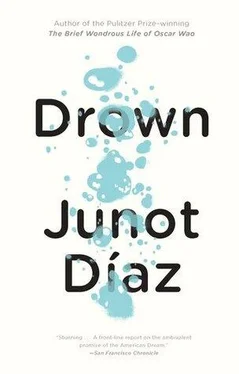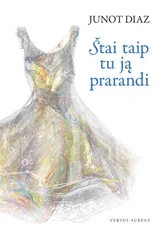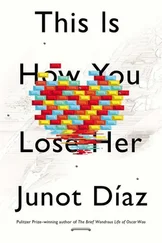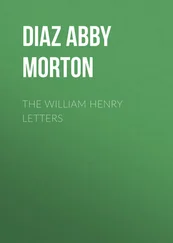The initial fights, with Mami throwing our silverware into wild orbits, lasted a week. After a fork pierced him in the cheek, Papi decided to move out, just until things cooled down. He took a small bag of clothes and broke out early in the morning. On his second night away from the house, with the puta asleep at his side, Papi had a dream that the money Mami’s father had promised him was spiraling away in the wind like bright bright birds. The dream blew him out of bed like a gunshot. Are you OK? the puta asked and he shook his head. I think I have to go somewhere, he said. He borrowed a clean mustard-colored guayabera from a friend, put himself in a concho and paid our abuelo a visit.
Abuelo had his rocking chair in his usual place, out on the sidewalk where he could see everyone and everything. He had fashioned that chair as a thirtieth-birthday present to himself and twice had to replace the wicker screens that his ass and shoulders had worn out. If you were to walk down to the Duarte you would see that type of chair for sale everywhere. It was November, the mangoes were thudding from the trees. Despite his dim eyesight, Abuelo saw Papi coming the moment he stepped onto Sumner Welles. Abuelo sighed, he’d had it up to his cojones with this spat. Papi hiked up his pants and squatted down next to the rocking chair.
I am here to talk to you about my life with your daughter, he said, removing his hat. I don’t know what you’ve heard but I swear on my heart that none of it is true. All I want for your daughter and our children is to take them to the United States. I want a good life for them.
Abuelo searched his pockets for the cigarette he had just put away. The neighbors were gravitating towards the front of their houses to listen to the exchange. What about this other woman? Abuelo said finally, unable to find the cigarette tucked behind his ear.
It’s true I went to her house, but that was a mistake. I did nothing to shame you, viejo. I know it wasn’t a smart thing to do, but I didn’t know the woman would lie like she did.
Is that what you said to Virta?
Yes, but she won’t listen. She cares too much about what she hears from her friends. If you don’t think I can do anything for your daughter then I won’t ask to borrow that money.
Abuelo spit the taste of car exhaust and street dust from his mouth. He might have spit four or five times. The sun could have set twice on his deliberations but with his eyes quitting, his farm in Azua now dust and his familia in need, what could he really do?
Listen Ramón, he said, scratching his arm hairs. I believe you. But Virta, she hears the chisme on the street and you know how that is. Come home and be good to her. Don’t yell. Don’t hit the children. I’ll tell her that you are leaving soon. That will help smooth things between the two of you.
Papi fetched his things from the puta’s house and moved back in that night. Mami acted as if he were a troublesome visitor who had to be endured. She slept with the children and stayed out of the house as often as she could, visiting her relatives in other parts of the Capital. Many times Papi took hold of her arms and pushed her against the slumping walls of the house, thinking his touch would snap her from her brooding silence, but instead she slapped or kicked him. Why the hell do you do that? he demanded. Don’t you know how soon I’m leaving?
Then go, she said.
You’ll regret that.
She shrugged and said nothing else.
In a house as loud as ours, one woman’s silence was a serious thing. Papi slouched about for a month, taking us to kung fu movies we couldn’t understand and drilling into us how much we’d miss him. He’d hover around Mami while she checked our hair for lice, wanting to be nearby the instant she cracked and begged him to stay.
One night Abuelo handed Papi a cigar box stuffed with cash. The bills were new and smelled of ginger. Here it is. Make your children proud.
You’ll see. He kissed the viejo’s cheek and the next day had himself a ticket for a flight leaving in three days. He held the ticket in front of Mami’s eyes. Do you see this?
She nodded tiredly and took up his hands. In their room, she already had his clothes packed and mended.
She didn’t kiss him when he left. Instead she sent each of the children over to him. Say good-bye to your father. Tell him that you want him back soon.
When he tried to embrace her she grabbed his upper arms, her fingers like pincers. You had best remember where this money came from, she said, the last words they exchanged face-to-face for five years.
He arrived in Miami at four in the morning in a roaring poorly booked plane. He passed easily through customs, having brought nothing but some clothes, a towel, a bar of soap, a razor, his money and a box of Chiclets in his pocket. The ticket to Miami had saved him money but he intended to continue on to Nueva York as soon as he could. Nueva York was the city of jobs, the city that had first called the Cubanos and their cigar industry, then the Bootstrap Puerto Ricans and now him.
He had trouble finding his way out of the terminal. Everyone was speaking English and the signs were no help. He smoked half a pack of cigarettes while wandering around. When he finally exited the terminal, he rested his bag on the sidewalk and threw away the rest of the cigarettes. In the darkness he could see little of Northamerica. A vast stretch of cars, distant palms and a highway that reminded him of the Máximo Gómez. The air was not as hot as home and the city was well lit but he didn’t feel as if he had crossed an ocean and a world. A cabdriver in front of the terminal called to him in Spanish and threw his bag easily in the back seat of the cab. A new one, he said. The man was black, stooped and strong.
You got family here?
Not really.
How about an address?
Nope, Papi said. I’m here on my own. I got two hands and a heart as strong as a rock.
Right, the taxi driver said. He toured Papi through the city, around Calle Ocho. Although the streets were empty and accordion gates stretched in front of store-fronts Papi recognized the prosperity in the buildings and in the tall operative lampposts. He indulged himself in the feeling that he was being shown his new digs to ensure that they met with his approval. Find a place to sleep here, the driver advised. And first thing tomorrow get yourself a job. Anything you can find.
I’m here to work.
Sure, said the driver. He dropped Papi off at a hotel and charged him five dollars for half an hour of service. Whatever you save on me will help you later. I hope you do well.
Papi offered the driver a tip but the driver was already pulling away, the dome atop his cab glowing, calling another fare. Shouldering his bag, Papi began to stroll, smelling the dust and the heat filtering up from the pressed rock of the streets. At first he considered saving money by sleeping outside on a bench but he was without guides and the inscrutability of the nearby signs unnerved him. What if there was a curfew? He knew that the slightest turn of fortune could dash him. How many before him had gotten this far only to get sent back for some stupid infraction? The sky was suddenly too high. He walked back the way he had come and went into the hotel, its spastic neon sign obtrusively jutting into the street. He had difficulty understanding the man at the desk, but finally the man wrote down the amount for a night’s stay in block numbers. Room cuatro-cuatro, the man said. Papi had as much difficulty working the shower but finally was able to take a bath. It was the first bathroom he’d been in that hadn’t curled the hair on his body. With the radio tuned in and incoherent, he trimmed his mustache. No photos exist of his mustache days but it is easily imagined. Within an hour he was asleep. He was twenty-four. He didn’t dream about his familia and wouldn’t for many years. He dreamed instead of gold coins, like the ones that had been salvaged from the many wrecks about our island, stacked high as sugar cane.
Читать дальше












